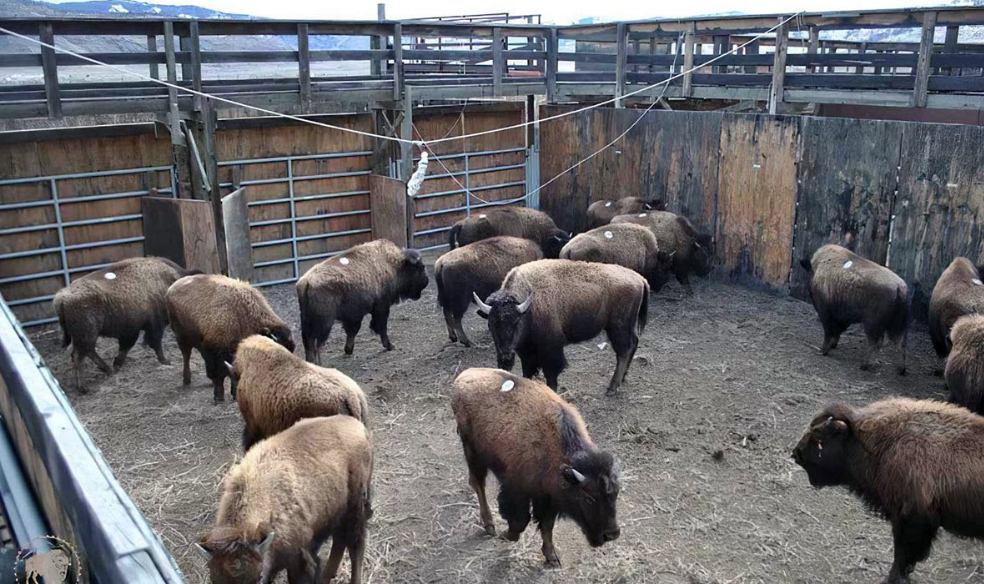
- Details
- By Native News Online Staff
Yellowstone National Park's Senior Bison Biologist, Chris Geremia, informed Buffalo Field Campaign (BFC) Campaign Coordinator, Mike Mease, that Yellowstone has trapped a group of 200–210 buffalo at Stephens Creek near Gardiner, Montana. The buffalo began their annual migration into the Gardiner Basin last week, and the park started capturing groups of approximately 60 on Tuesday, March 4th, continuing through the morning of March 6th (58). These are the first buffalo to migrate into the basin this season.
This practice goes back years. Last year, BFC Board Member James Holt commented: “Luring and trapping Buffalo inside Yellowstone Park is a decades-long practice that continues because of Montana’s stance to not permit a self-sustaining wild Buffalo population in the state. Wild Buffalo herds should be thriving on millions of acres of National public trust lands but for the capitulation of the U.S. Forest Service and National Park Service to Montana’s plan of managing wild buffalo for extinction.”
BFC Board Vice President and Tribal Sovereignty & Indigenous Lifeways Program Director, Dallas Gudgell (Yankton Dakota) states that BFC is looking for solutions as the current and decades old Interagency Bison Management Plan (IBMP) continues to fail the Buffalo, tribal people, and community members.
"BFC believes that the best solution is bring tribal leaders to the decision making management table and in the form of Tribal Co-management. It's time to bring Indigenous voices in to help determine how to restore and conserve wild migratory Buffalo and exercise treaty rights. It is time to allow the Buffalo to find their own tolerance zones and then protect those habitats as was done Horse Butte," Gudgell said.
More Stories Like This
Native News Weekly (August 25, 2024): D.C. BriefsUS Presidents in Their Own Words Concerning American Indians
Indigenous Actor Elaine Miles Reports Detention by Alleged ICE Agents
Happy Thanksgiving from Native News Online
Coming Up on Native Bidaské: Behind the Animation: Joey Clift Talks “Pow” and Native Storytelling
Help us tell the stories that could save Native languages and food traditions
At a critical moment for Indian Country, Native News Online is embarking on our most ambitious reporting project yet: "Cultivating Culture," a three-year investigation into two forces shaping Native community survival—food sovereignty and language revitalization.
The devastating impact of COVID-19 accelerated the loss of Native elders and with them, irreplaceable cultural knowledge. Yet across tribal communities, innovative leaders are fighting back, reclaiming traditional food systems and breathing new life into Native languages. These aren't just cultural preservation efforts—they're powerful pathways to community health, healing, and resilience.
Our dedicated reporting team will spend three years documenting these stories through on-the-ground reporting in 18 tribal communities, producing over 200 in-depth stories, 18 podcast episodes, and multimedia content that amplifies Indigenous voices. We'll show policymakers, funders, and allies how cultural restoration directly impacts physical and mental wellness while celebrating successful models of sovereignty and self-determination.
This isn't corporate media parachuting into Indian Country for a quick story. This is sustained, relationship-based journalism by Native reporters who understand these communities. It's "Warrior Journalism"—fearless reporting that serves the 5.5 million readers who depend on us for news that mainstream media often ignores.
We need your help right now. While we've secured partial funding, we're still $450,000 short of our three-year budget. Our immediate goal is $25,000 this month to keep this critical work moving forward—funding reporter salaries, travel to remote communities, photography, and the deep reporting these stories deserve.
Every dollar directly supports Indigenous journalists telling Indigenous stories. Whether it's $5 or $50, your contribution ensures these vital narratives of resilience, innovation, and hope don't disappear into silence.
 The stakes couldn't be higher. Native languages are being lost at an alarming rate. Food insecurity plagues many tribal communities. But solutions are emerging, and these stories need to be told.
The stakes couldn't be higher. Native languages are being lost at an alarming rate. Food insecurity plagues many tribal communities. But solutions are emerging, and these stories need to be told.
Support independent Native journalism. Fund the stories that matter.
Levi Rickert (Potawatomi), Editor & Publisher

